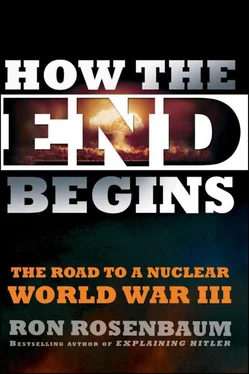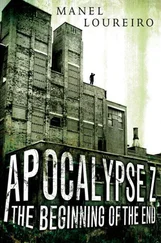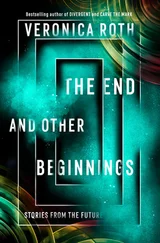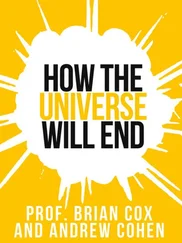Hindu and Muslim terrorism in Kashmir or elsewhere on the subcontinent escalates into preemptive nuclear exchanges between India and Pakistan. China comes to the aid of its traditional ally, Pakistan, against its traditional enemy, India. A rogue Indian general decides to strike China with a nuke, triggering reprisal. Muslim regional nuclear commanders in southern Russia (long a concern of both the U.S. and Russian military) enter the fray, perhaps seizing the radioactive fog of war to strike Israel, which retaliates against Russia, which strikes back, raising the possibility of drawing the U.S. into the conflagration. Once the nuclear genie is unleashed there may be no part of the globe that remains immune.
If not Pakistan and India, Pakistan and Israel. The more Pakistan has referred to its bomb as an “Islamic bomb” the more the Israelis have felt it as “an existential threat,” a threat to its very existence. Israel, for its part, has been described by a nuclear strategist as “a one-bomb state” because one single-megaton-size bomb would be enough to render it an uninhabitable land of the dead and dying.
Thus the margin between existential threat to Israel and Israeli preemptive launch to prevent it is thin and getting thinner. Seconds. Minutes, maybe. Any serious threat, in other words, could be used to justify preemption. (See chapter 7.)
And should the Israelis get involved in a conflict with another Islamic state, Iran or Syria, say, what role would the Pakistani Islamic bomb play? Potentially an intervention on behalf of other Islamic states? Retaliation for Israeli use of nukes? Or could the Pakistani nukes just as likely become the target of a preemptive Israeli strike to ensure they could not be an instrument of any Islamic retaliation against an Israeli air strike against Iran, for example?
The problem with Pakistan is not just that it has a nuclear arsenal and is constantly threatening to use it against India. The problem is also that its government is unstable (in just the last three years, Pervez Musharraf was forced out, Benazir Bhutto came back and was assassinated), and the current prime minister, her husband, is regarded as slowly losing his grip on power and in particular on the nuclear arsenal to Pakistan’s Inter-Services Intelligence agency, the ISI, which is widely believed to be infiltrated by Al Qaeda and the Taliban. [38]The agency is deeply involved both in Islamist and terrorist plots against India, Israel, and the West. Some Al Qaeda experts argue that Osama bin Laden’s search for some crude self-made nuke, or a suitcase nuke, from a rotting relic of the former Soviet Union hasn’t been successful because he wasn’t trying very hard. His real goal was simply taking over the Pakistani government and its sixty new nukes ready to fire by the “authorized” command. All he had to do was bide his time, let the trends play out, and ultimately they would fall into his hands.
And then what? Needless to say the war-gaming for this eventuality had been going on in the Pentagon for years. But no one seems to know—no one in the unclassified literature had even proposed—a game-winning strategy should the worst happen and bin Laden or an ally ends up heading a nuclear-armed Pakistani government.
If an ISI/Taliban/Al Qaeda–friendly coup was successful, the U.S. would have some hard decisions to make in a terribly short period of time. Take out, as in destroy, the Pakistani nukes, as many, as fast as we could? “Take custody” of them, as one expert put it? Of course there is the little problem that we don’t know where all of them are. We could send in special ops teams to secure the ones we can locate, but even assuming that goes well (preemptive detention of another nation’s nuclear arsenal), there is the risk of some remaining out of our reach.
On the other hand allowing an Al Qaeda–friendly government possession of sixty nukes? Hardly tenable. Which of course makes for some hard choices on the part of the putative Al Qaeda–friendly new Pakistani rulers as well. Expecting American intervention, they might well feel they would be in a “use it or lose it” position the moment they took control. We must use them before they’re seized or destroyed. Or at least hide them before the Americans can seize them.
The Pakistani government has recurrently reassured the world that only “authorized” arms of the government have control over their nukes. But nearly simultaneous reports in the New York Times and the Wall Street Journal in late 2007 made clear that the U.S. had not given the Pakistanis a key bit of centralized weapons control technology called PALs (Permissive Action Links) that were meant to ensure that some local commander wouldn’t decide to start a holy war on his own without the authorization codes from the central government. [39]The obvious problem is that even if the nukes are ensured against unauthorized launches, the fragile central Pakistani government can fall into the hands of extremists, who will then have the power to make authorized launches.
A nightmare. And yet such a situation is not unimaginable. More than one nuclear strategist, including Israelis concerned about Iran, have told me that Pakistan is the most immediate, unstable, insoluble, potential nuclear flashpoint we face. [40]Unless you count…
THE UNFATHOMABLE AMBITIONS OF NORTH KOREA
North Korea is estimated to have eighty-two pounds of bomb-grade plutonium. [41]That’s what they’ve officially admitted to in the ever-breaking-down Six-Party talks with the North Koreans that are repeatedly announcing gains that are then reversed. This is about enough to make six powerful (one-megaton-plus) nuclear weapons, and some experts think they have enough to make twelve or more. They also have the No-dong missile, whose tests in the Pacific have indicated a range long enough to hit our West Coast. But that probably would not be a madman dictator like Kim Jong-il’s primary target. More likely it would be war breaking out, either on purpose or accidentally, between North and South Korea, which is under our nuclear umbrella should it be threatened or come under nuclear attack from its northern enemy. “The bad news about North Korea,” Jonathan Pollack, a North Korea expert at the Naval War College, told the New York Times, “is that we don’t know much about their nuclear control system. Or even if they have much of one.” [42]
That’s the bad news. He didn’t mention any good news. Just another rogue state flashpoint that could at any moment go from potential nuclear nightmare to horrific reality.
IRAN, ISRAEL, AND THE NIE SCANDAL
It is not uncommon for Israel politicians to use two emotionally loaded phrases, often in the same sentence: “existential threat” and “second Holocaust.” They are, needless to say, inextricably linked. An “existential threat” to the state of Israel, a threat to the very existence of the nearly six million Jews there, means, in effect, a “second Holocaust.” And to many, there is something exponentially more horrific about the secondness of a Holocaust happening to the same people—something that virtually guarantees a third, retaliatory one, in response.
Yes there is dispute over how imminent the threat really is, especially from Iran. At the heart of the dispute is the 2007 National Intelligence Estimate (NIE) on Iran’s nuclear program. [43]The NIE is meant to synthesize the judgments of the entire spectrum of U.S. military and civilian intelligence. Control over NIE conclusions can mean control over policy. The 2007 NIE, if read closely, reported that Iran had suspended work on only one aspect of its nuclear program—warhead design. But according to unequivocal remarks by the high-ranking intelligence officials who signed off on the report—and according to later independently discovered facts by the U.N.’s International Atomic Energy Agency inspectors—the press and a world eager to believe that there was no problem anymore misunderstood the NIE and incorrectly headlined it as proof that Iran had ceased seeking nuclear weapons. [44]While the warhead design program may have been suspended, work is racing forward on the other two aspects of nuclear weapon making: uranium fuel enrichment and nuclear-capable missile building.
Читать дальше











